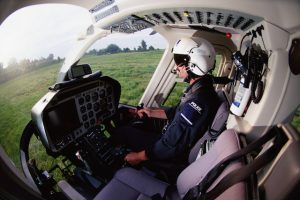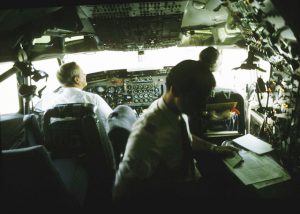APS – Airline Pilot Standard Course
 In the highly regulated and demanding field of aviation, the Airline Pilot Standard (APS) course stands out as a critical training program designed to meet the highest standards of proficiency and safety. As airlines seek to maintain impeccable safety records and operational efficiency, the need for pilots who have undergone rigorous training becomes ever more pressing. The APS course is a comprehensive training regimen aimed at preparing pilots for the realities and challenges of airline operations. In this article, we will explore what the APS course entails, its importance, and the benefits it offers to aspiring airline pilots.
In the highly regulated and demanding field of aviation, the Airline Pilot Standard (APS) course stands out as a critical training program designed to meet the highest standards of proficiency and safety. As airlines seek to maintain impeccable safety records and operational efficiency, the need for pilots who have undergone rigorous training becomes ever more pressing. The APS course is a comprehensive training regimen aimed at preparing pilots for the realities and challenges of airline operations. In this article, we will explore what the APS course entails, its importance, and the benefits it offers to aspiring airline pilots.
What is APS – Airline Pilot Standard Course?
The APS course, short for Airline Pilot Standard, is an advanced pilot training program developed to bridge the gap between basic commercial pilot training and the specific demands of airline operations. It is designed to ensure that pilots not only meet regulatory requirements but also possess the skills and knowledge necessary to operate in a commercial airline environment.
The course is typically offered to pilots who have already obtained their Commercial Pilot License (CPL) and are looking to advance their careers by obtaining an Airline Transport Pilot License (ATPL) or Multi-Crew Pilot License (MPL). The APS course covers a wide range of topics, including advanced flight techniques, crew resource management (CRM), safety management systems (SMS), and airline-specific procedures.
Importance of APS course
- Enhancing safety: Safety is the cornerstone of aviation. The APS course provides pilots with advanced training in risk management, emergency procedures, and situational awareness. This comprehensive training enhances a pilot’s ability to anticipate and respond to potential threats, thereby reducing the likelihood of accidents.
- Meeting regulatory standards: Aviation authorities worldwide have stringent regulations to ensure the highest levels of safety and efficiency. The APS course ensures that pilots are well-versed in these regulations and equipped to meet and exceed these standards.
- Improving operational efficiency: Advanced training in areas such as flight planning, fuel management, and aircraft performance can lead to more efficient operations. Pilots who have completed the APS course can optimize flight paths, reduce fuel consumption, and improve overall operational efficiency.
- Career advancement: Completing the APS course can significantly enhance a pilot’s career prospects. The advanced skills and knowledge gained through the course make pilots more competitive for positions within airlines. It also demonstrates a commitment to professional development, which is highly valued by employers.
- Bridging training gap: The transition from basic pilot training to airline operations can be challenging. The APS course bridges this gap by providing pilots with the specific skills and knowledge needed for airline operations, thereby making the transition smoother and more effective.
Key Components of APS course
The APS course is a comprehensive training program that covers a wide range of topics. Here are some of the key components typically included in the course:
- Advanced flight techniques: Pilots learn advanced flight manoeuvres and techniques that go beyond basic flying skills. This includes precision approaches, complex airspace navigation, and handling challenging weather conditions. Training in these areas enhances a pilot’s ability to perform under various scenarios.
- Multi-crew coordination (MCC): Working effectively as part of a crew is essential in airline operations. The APS course includes Multi-Crew Coordination (MCC) training, which focuses on communication, teamwork, and decision-making within a multi-pilot environment. This training ensures that pilots can work seamlessly with their colleagues to ensure safe and efficient flight operations.
- Crew resource management (CRM): CRM training is a critical component of the APS course. It teaches pilots how to utilize all available resources, including human, hardware, and information, to ensure safe and efficient operations. CRM training covers communication, leadership, decision-making, and stress management.
- Safety management systems (SMS): Understanding and implementing Safety Management Systems (SMS) is crucial for maintaining high safety standards in aviation. The APS course provides training on SMS principles, including hazard identification, risk assessment, and safety performance monitoring. This training helps pilots contribute to their airline’s safety culture.
- Emergency procedures and crisis management: Pilots must be prepared to handle emergencies effectively. The APS course provides advanced training in emergency procedures, including engine failures, medical emergencies, and system malfunctions. Crisis management training equips pilots with the skills needed to remain calm and composed during high-pressure situations.
- Aviation law and regulations: Staying informed about aviation laws and regulations is crucial for compliance and safety. The APS course offers comprehensive training on national and international aviation regulations, air traffic control procedures, and the legal responsibilities of pilots.
- Aircraft systems and performance: In-depth knowledge of aircraft systems and performance is vital for safe and efficient flight operations. The APS course provides advanced training on aircraft engines, avionics, navigation systems, and performance optimization. Pilots learn how to troubleshoot system malfunctions and make informed decisions based on aircraft performance data.
- Flight planning and fuel management: Efficient flight planning and fuel management are critical for optimizing flight operations. The APS course teaches pilots how to create detailed flight plans, calculate fuel requirements, and manage fuel consumption during flight. This training helps pilots minimise fuel costs and reduce environmental impact.
Benefits of APS course
- Enhanced safety: The primary benefit of the APS course is enhanced safety. Pilots gain advanced knowledge and skills that enable them to anticipate and respond to potential hazards effectively. This reduces the risk of accidents and ensures the safety of passengers and crew.
- Improved decision-making: The APS course improves pilots’ decision-making abilities by providing training in risk assessment, situational awareness, and crisis management. Pilots learn to make informed decisions quickly and confidently, even under pressure.
- Career advancement opportunities: Completing the APS course can open up new career opportunities for pilots. The advanced skills and knowledge gained through the course make pilots more competitive for positions within airlines. It also demonstrates a commitment to professional development, which is highly valued by employers.
- Greater operational efficiency: The APS course provides training in areas such as flight planning, fuel management, and aircraft performance optimisation. This leads to more efficient flight operations, reduced fuel consumption, and cost savings for airlines.
- Personal and professional growth: Beyond technical skills, the APS course also focuses on personal and professional development. Pilots enhance their leadership, communication, and teamwork abilities, which are essential for fostering a positive cockpit environment and improving crew coordination.
- Networking opportunities: The APS course often brings together pilots from various backgrounds and experiences. This provides an opportunity for networking and exchanging knowledge with peers. Building connections with other pilots can lead to valuable insights, support, and career opportunities.
Who should take the APS course?
The APS course is designed for a wide range of pilots, including:
- Commercial pilots: Commercial pilots can benefit from the APS course by gaining advanced skills that improve their operational efficiency and safety. The training prepares them for higher responsibilities, such as becoming a captain or flight instructor.
- Corporate pilots: Corporate pilots often operate in diverse and challenging environments. The APS course provides them with the advanced knowledge and skills needed to navigate complex airspace, handle adverse weather, and ensure the safety of high-profile passengers.
- Military pilots: Military pilots transitioning to civilian aviation can benefit from the APS course by gaining a deeper understanding of civil aviation regulations, procedures, and best practices. The training helps them adapt to the unique challenges of civilian flight operations.
- Flight instructors: Flight instructors play a crucial role in training the next generation of pilots. The APS course provides them with advanced teaching techniques, decision-making skills, and knowledge of the latest aviation developments. This enhances their ability to train and mentor student pilots effectively.
- Airline captains: Airline captains are responsible for the overall safety and efficiency of flight operations. The APS course provides them with advanced leadership, decision-making, and crisis management skills. This prepares them to handle complex scenarios and lead their flight crews effectively.
Choosing the right APS course
When selecting an APS course, it is essential to consider several factors to ensure the course meets your needs and goals. Here are some key considerations:
- Course content: Ensure that the course covers the key areas relevant to your career and skill development goals. Look for a comprehensive curriculum that includes modules on advanced flight techniques, multi-crew coordination, CRM, SMS, emergency procedures, and aviation regulations.
- Accreditation and recognition: Choose a course that is accredited by a recognised aviation authority or educational institution. Accreditation ensures that the course meets high standards of quality and is recognised by employers and regulatory bodies.
- Delivery method: Consider the delivery method that best suits your learning style and schedule. The APS course may be offered in various formats, including online, in-person, or a combination of both. Online courses provide flexibility, while in-person courses offer opportunities for hands-on training and networking.
- Duration and time commitment: Evaluate the duration and time commitment required for the course. Ensure that it fits within your schedule and allows you to balance your work and personal responsibilities. Some courses may be intensive and require full-time commitment, while others may offer part-time or modular options.
- Cost and value: Consider the cost of the course and whether it represents a good investment in your professional development. Look for courses that offer value for money and provide additional resources or support, such as access to flight simulators, mentoring, and networking opportunities.
Conclusion
The APS – Airline Pilot Standard course is a valuable investment in professional development for pilots. It provides aviators with the advanced skills and knowledge needed to excel in their roles and ensure the highest standards of aviation safety and efficiency. The course covers a wide range of topics, including advanced flight techniques, multi-crew coordination, CRM, SMS, emergency procedures, and aviation regulations. By completing the APS course, pilots can enhance their safety, improve their decision-making, advance their careers, and contribute to more efficient flight operations. Whether you are a commercial pilot, corporate pilot, military pilot, flight instructor, or airline captain, the APS course can provide the training and credentials needed to achieve your career goals and ensure long-term success in aviation. When choosing an APS course, consider factors such as course content, accreditation, delivery method, duration, and cost to select the right program for your needs. With the right APS course, pilots can elevate their skills and advance their careers in the ever-evolving field of aviation.










